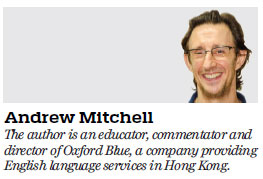Parent education is key issue in quality schooling
Updated: 2017-10-30 07:43
By Andrew Mitchell(HK Edition)
|
|||||||
Andrew Mitchell points out many mothers and fathers desire heavy homework loads, a pressure-cooker learning environment and dread the prospect of fun - all of which is a recipe for unhappy children
For anyone actively involved in education in Hong Kong, as I am, it was encouraging to see Chief Executive Carrie Lam Cheng Yuet-ngor make a firm commitment to quality education in her first Policy Address. As part of this commitment, HK$3.6 billion in additional recurrent expenditure has already been allocated for a raft of "first-phase measures" covering the whole education sector, leaving a further HK$1.4 billion additional budget to be assigned in line with her election manifesto pledge.
To ensure this money is put to good use, the Education Bureau will carry out in-depth reviews on eight key areas of education: professional development, curriculum arrangement, assessment, vocational and professional education and training, self-financing post-secondary education, school-based management, parent education and University Grants Committee funding.
It is particularly heartening to see parent education included here, as without a fundamental change in the attitude of parents, it is very hard to see quality education flourishing in Hong Kong. Over the past decade, I have taught or tutored a number of local primary- and secondary-school students, and while my overall impression of them is very favorable, I have observed some common traits that I find quite disturbing - low levels of happiness, a lack of intrinsic motivation and a fear of failure. These traits are borne out in the most recent Programme for International Student Assessment test, where Hong Kong 15-year-olds reported very low levels of life satisfaction and sense of belonging at school, and a high level of schoolwork-related anxiety.

It is easy to blame the local school system for this, as I did in a recent article calling for the establishment of a post-colonial education sector. However to simply blame the system is to ignore the fundamental role parents play within the system.
Parents of my tutorial students often ask me to give their children more homework. Yet the students themselves always complain that they have far too much already. So, as a compromise, I encourage them to read for pleasure in English. However the notion of actually enjoying a homework activity is anathema to parents raised on an educational diet of rote learning and memorization. Indeed, even for parents educated overseas, it is extremely hard not to get sucked into the pressure cooker of Hong Kong education, where results are all-important, private tutors are ubiquitous and fun is the f-word.
Yet, as I emphasized last year in an article on kindergarten education, having fun through play is an extremely important factor in the learning and emotional development of all children. It is so important that it has been recognized by the United Nations High Commission for Human Rights as a right of every child.
Given the low importance accorded to fun in most local schools, it is hardly surprising that the average Hong Kong student is not very happy. According to the most recent Hong Kong Children's Happiness Index, compiled by the Centre for Public Policy Studies at Lingnan University, the level of happiness among local primary- and secondary-school students is only 6.49 on a scale of 0 to 10. Moreover there are worryingly high levels of depression and anxiety among local students. A survey conducted by Baptist Oi Kwan Social Service earlier this year found more than half of Hong Kong secondary-school students show symptoms of depression, while a quarter display signs of anxiety. Findings like these form the backdrop to the shamefully high suicide rate among Hong Kong youths. A government-commissioned report made public in the summer revealed that some 71 students had taken their lives in the three school years from 2013. This alarming statistic cannot be ascribed solely to poor parenting any more than it can be ascribed solely to high-pressure schooling but it seems clear that a causal link exists between what is happening at home and in the classroom and what is going on in the minds of our young people.
So as the government looks to embrace the concept of quality education, it is essential that sufficient funds are allocated to parent education. If not, the CE's vision of quality education will inevitably be clouded by the actions of well-meaning but misguided parents. These parents need to be taught the adverse effects of pushing their children too hard - often needlessly. As in the words of Albert Einstein: "Education is not the learning of facts but the training of the mind to think." Parents also need to be shown the links between academic stress and anxiety. Above all, though, they need to be made aware of the role of fun in learning. For in the world of education it's not fun that's the f-word; it's fear.
(HK Edition 10/30/2017 page10)